A visit with David Popovici, the world’s fastest swimmer
At 18, the Romanian athlete holds the world record in the 100m freestyle and is expected to shine even brighter at the upcoming world championships in Japan
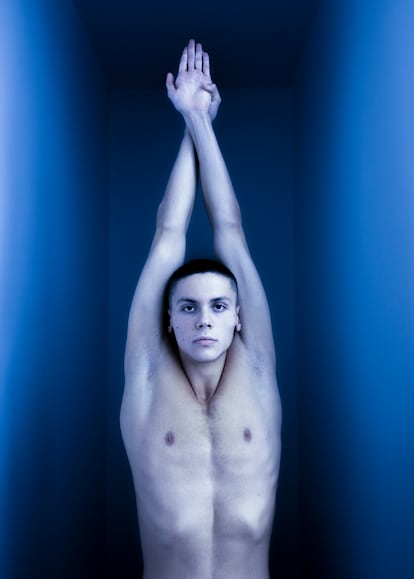
Dawn breaks in Bucharest. Six days a week – Monday to Saturday – like clockwork he rises at 5:30 and eats a nourishing breakfast of oatmeal, fresh fruit and milk. Afterward, he heads to the gym for a workout before going to the Dinamo Club pool. The wooden sports complex is a relic of the Cold War, but it has withstood the test of time. Outside, a pair of crows squabble noisily. As the sun gently peeks through the windows, the doors open for dozens of children coming in for swimming lessons. David Popovici is already in the pool, gracefully gliding through the water
The world’s fastest man in the pool is an extraordinary 18-year-old who moves with stealthy speed through the water. His muscles, taut like whips, stretch across his limbs. He’s a tall 1.90m (6ft 2in) with a broad wingspan of 2.04m (6ft 7in). Strangely, his glide seems shallow, almost like he’s floating at the surface. Silently and gracefully, his arms move in a precise motion, creating a gentle yet powerful paddle-like sound. His seemingly languid strokes defy logic as he moves at an astounding speed. He completes a series of eight 100-meter swims in a breathtaking 56 seconds each. His pace pushes his body to what physiologists call the VO2 max – the maximum amount of oxygen that an individual can use during intense exercise. Popovici’s engine is running red hot, but his face remains impassive.
“I feel like I belong there, yeah,” he says when I ask if living in the water comes as naturally as it seems. “But there’s an art to simplicity… It’s actually very tough. To make something seem simple, you have to master the complicated stuff. I am more impressed by chefs who can take basic dishes and make them absolutely delicious, than by those complex dishes with exotic ingredients that taste strange. Being great at simplicity takes serious skill, because the truth is, nothing is ever simple.”
Popovici’s English is somewhat formal, clearly learned in school. It sounds quite eloquent as he describes his convictions, but he also displays a penchant for digression. It’s clear that there’s more to this young man than just being the fastest swimmer on the planet today.
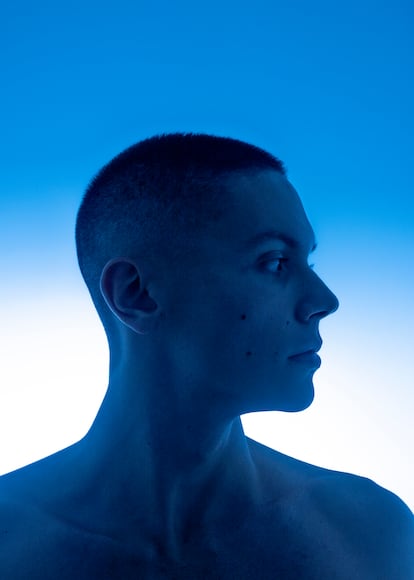
On August 13, 2022, he shattered the world record for the 100-meter freestyle. His remarkable time of 46.86 seconds was more than just a new record. It marked the end of an era defined by controversial “technological doping,” such as the polyurethane swimsuits in the early 2000s that provided extra buoyancy for competitors with bulkier physiques at the expense of true skill. The record Popovici broke belonged to Brazilian César Cielo, who had recorded a time of 46.91 at the 2009 Rome World Championships without using the super suits that were banned in 2010. In the following years, the speed champions were large and powerful men who churned through the water creating huge wakes in their lanes. Until Popovici came along with his subtle finesse.
“If you compare me to other swimmers, it might seem like it’s easier for me,” said Popovici. “But every training session involves the same level of effort – the pain never changes. Only by internalizing the lessons from pain can you surpass your limits in competition. I’ve developed my own mental pain scale and I often feel more exhausted training than during races. Understanding this pain helps me stay focused in races when my hands start to burn and my feet feel like they’re detaching from my ankles.”
He likes to think his swimming style is revolutionary. He doesn’t worry about technique or stroke biomechanics; instead, he focuses on maintaining a “basic sense of synchronization. It’s just a matter of perfecting it every day,” said Popovici. “There is no magic, secret or super potion. High performance, really, is quite boring – 99% of the time, all you do is train. You compete three or four times a year, and it feels like you spend most of your time just staring at a black line at the bottom of a pool. You must find a way to manage that boredom. If you have a ‘why,’ you can endure almost any ‘how,’ which are what many people call sacrifices. I call them choices. I choose not to waste my time partying or sleeping a lot. For me, eight hours seems like too much.”
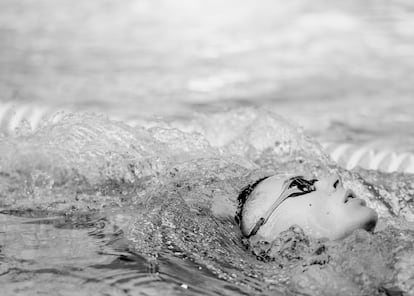
“I do consider myself different,” he says. “Winning the 2022 World Championships was the beginning of this revolution – it was something new for me. I don’t want to be hypocritical. I honestly understand that people can’t imagine doing what I do. But everyone has a role and this is mine. I always wanted to stand out. My mom always warned me about trying to blend in with the crowd and that affected my style. My coach saw it right away. My style is not conventionally correct, especially for the events I usually swim – the 100m and 200m freestyle. But he didn’t try to change it. I still swim exactly the same way I did when I was a kid.”
For a century, Olympic swimming has showcased athletes who trained rigorously and scientifically. The 100-meter freestyle often seemed to be the exclusive purview of wealthy nations with ample resources. The world-record holders in this event include 15 swimmers from the United States, five from Australia, three from France, two from Brazil, one from the Netherlands, one from Germany, one from Russia, one from Hungary, one from South Africa... and a lone Romanian.
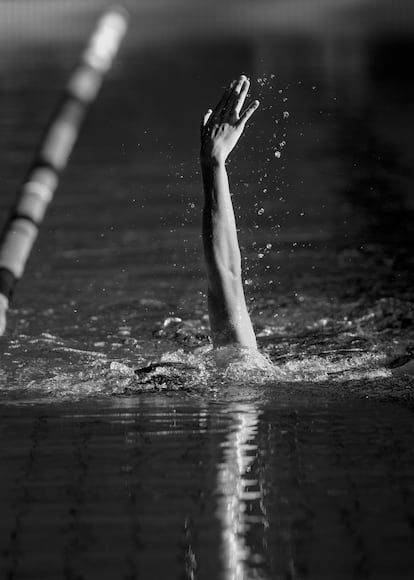
Popovici’s performance at the Tokyo 2020 Summer Olympics grabbed the attention of prestigious swimming programs at Stanford, Berkeley, Indiana, Michigan, Florida, Los Angeles, and Texas. Recognizing his exceptional talent, these top US college teams showered scholarship offers on him and tried to lure him to the world’s biggest economy with promises of lucrative corporate sponsorships. Popovici declined and chose to stay in the familiar confines between Transylvania to the north and the Danube River to the south.
Popovici’s father Mihailo, a commercial agent for a pharmaceutical company, has been in charge of the Dinamo Club swimming school since December 2022. “David is not a product of a national high-performance sports program,” said Mihailo. “He was 10 years old when we took him to Aquateam, the winningest club in Bucharest. After a few weeks we asked the coach, ‘Is everything okay?’ He said, ‘Not really. David doesn’t pay attention and is always joking around, asking too many questions and skipping exercises. We’re sorry, but he’s not what we’re looking for.’ David was the most undisciplined kid in the group, so they pushed him down a level. He was then assigned to a very young trainer because everyone else rejected him.”
That trainer was Adrian Radulescu, a recent physical education graduate with no coaching experience. But in just two years, Radulescu turned the undisciplined boy into a national champion, and ever since he was 13, Popovici has dominated both national and international rankings in the junior categories.
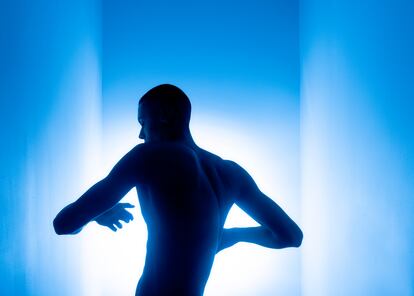
Radulescu, who has the air of a romantic intellectual, has created the perfect swimmer. But he doesn’t try to shield Popovici from the noisy school kids who often invade the pool. “If you put David in a bubble, you’ll end up having problems in the long run,” he said. “He’s an 18-year-old boy who’s itching to get his driver’s license. He’s into stuff that other boys his age are into. Being alone in a pool all the time – is that healthy? We share the pool with the schools because it wouldn’t be fair to the other kids to reserve it just for David Popovici. These kids deserve to have a real connection with David.”
Radulescu, who is only 33 years old, smiles when asked if his lack of experience served him well. “I saw an interview with Orson Welles where he was asked, ‘What made you think you could shoot Citizen Kane in such an unorthodox style?’ And he said, ‘Pure ignorance – it was the first film I made and I didn’t know any better. Also I had a cinematographer who never said no.’ David is my cinematographer.”
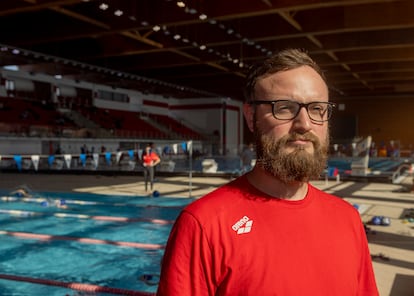
Popovici grew up in an apartment in the Pantilimon neighborhood (central Bucharest) where he still lives. He has just finished high school and scored an 8.65 on his university entrance exams. “He has offers from every university in the United States,” said Mihailo, “but he wants to study in Bucharest.”
“If there were better options, I might consider going to another country,” said Popovici. “But I want to keep the chemistry I have with my coach. I like the people around me and the atmosphere. I like this city, Bucharest. It’s strange and I enjoy riding my bike around it, but it’s so big that I keep getting lost. You come across beautiful gigantic buildings, old, ruined palaces, classical and Latin buildings, and some from the communist era from which we haven’t fully recovered. There’s a whole lot of opulence and then you see all these homeless people with nowhere to spend the night. All those wealthy people trying to flaunt their fortunes as if it means something… You see more supercars in Bucharest than in Milan! There are lots of things that need fixing here. Eventually, I’d love to be a voice that reaches out to people who need help. I truly believe I can use my image to make a positive impact in my country.”
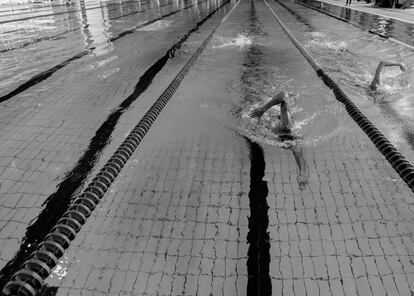
Corporate sponsors talk to him about the millions he could earn, but Popovici’s words are laced with thoughts about ethics. Radulescu encouraged him to read the Greek Stoic philosophers and the young man took his advice. The books piled on the shelf next to his bed reveal a quest: Oblomov; The Count of Monte Cristo; The Mamba Mentality by Kobe Bryant; Michael Jordan by Roland Lazenby; The Letters of Epicurus; Letters from a Stoic by Seneca; Meditations by Marcus Aurelius; and a volume of Dialogues of Plato.
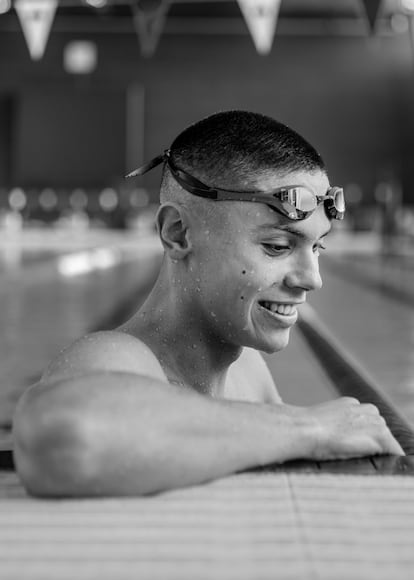
“Epicurus, Seneca and especially Marcus Aurelius have helped me find happiness,” he said. “It’s not the conventional happiness people talk about – laughing, tears of joy and big grins. It’s the happiness that comes from fulfillment. My definition of happiness is finding a balance, and the only thing that matters is what’s in my mind and heart. It’s when I feel good in training and races, regardless of the results.”
The results have turned into a brewing storm of massive celebrity. Popovici is the most popular personality in Romania, a symbol of success and pride for a nation in transformation. He is widely expected to win gold medals in both the 100m and 200m freestyle at the upcoming Fukuoka World Swimming Championships in late July, and also in the 2024 Paris Summer Olympics. Mihailo doesn’t hide his concern. “The economy gets better every year,” he said. “Romania has one of the highest growth rates in the European Union, but we started from a really low point. In sports, we’ve been going downhill since the 1989 revolution. We only managed to medal in rowing and fencing during the last Olympics. Now, everyone’s looking to swimming to bring home some medals. This is extra pressure on David’s shoulders. I don’t know if he’ll pull it off, but we all have our hopes up. Pressure, pressure... we’ll have to wait and see!”
Popovici shields himself from all this by building castles in his mind. “Each race is unique and an opportunity to show what you have been working on,” he said. “It’s not a display of power. In the grand scheme of things, the world won’t change one bit even if I win 300 Olympic medals. What will really make a difference is how and what I choose to share through my work, how I make people feel, and the messages I can send. That would leave a mark – using my image and my voice for a greater cause. Swimming is just my job and winning or losing is part of it. I want to be more than that. It may sound pretentious, but this new life has come to me very abruptly. People actually recognize me on the street. And it makes me stop and think, you know? What really matters to me? Is it just swimming? Well, swimming is great but what’s even more important is using swimming to do good. Like teaching people how to find happiness through sports. Just do something! Get out there and move because we’re all stuck in these bodies for the rest of our lives!”
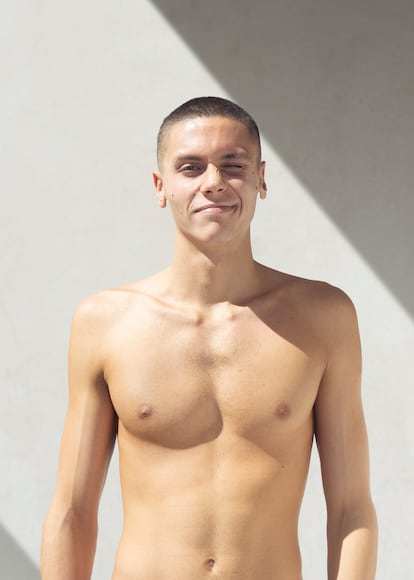
David Popovici clearly has a strong sense of ethics, but his aesthetic is still largely unexplored. Is there beauty in what he does? “My sponsor asked me to choose an animal to represent me in my line of swimwear and caps – a personal touch, you know?” he said. High-tech swimwear brand Arena has been Popovici’s sponsor since late 2021. “I went back and forth, like should I be a shark? Maybe an eagle? I wanted something alpha, the top predator in the food chain. So, what should I be? A killer whale or perhaps a crocodile? Then, my girlfriend came up with an idea – I hate to admit it, but it was her. She suggested a dragonfly. Yeah, an insect. Dragonflies are beautiful and delicate creatures that glide effortlessly on the water’s surface, not swimming nor fully airborne. My girlfriend said I look like a dragonfly when I swim. They’re swift predators, intelligent creatures and they don’t rely on brute strength. I kind of like the idea of being a dragonfly, of gliding effortlessly. The best part about swimming is that it makes me feel light and helps me forget all the negativity in life – the past, the future and the stress that catches up with us all sooner or later.”
Sign up for our weekly newsletter to get more English-language news coverage from EL PAÍS USA Edition
Tu suscripción se está usando en otro dispositivo
¿Quieres añadir otro usuario a tu suscripción?
Si continúas leyendo en este dispositivo, no se podrá leer en el otro.
FlechaTu suscripción se está usando en otro dispositivo y solo puedes acceder a EL PAÍS desde un dispositivo a la vez.
Si quieres compartir tu cuenta, cambia tu suscripción a la modalidad Premium, así podrás añadir otro usuario. Cada uno accederá con su propia cuenta de email, lo que os permitirá personalizar vuestra experiencia en EL PAÍS.
¿Tienes una suscripción de empresa? Accede aquí para contratar más cuentas.
En el caso de no saber quién está usando tu cuenta, te recomendamos cambiar tu contraseña aquí.
Si decides continuar compartiendo tu cuenta, este mensaje se mostrará en tu dispositivo y en el de la otra persona que está usando tu cuenta de forma indefinida, afectando a tu experiencia de lectura. Puedes consultar aquí los términos y condiciones de la suscripción digital.









































